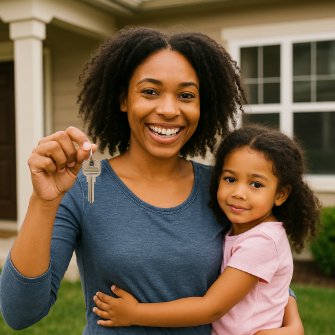Struggling with bad credit? Learn how to get a mortgage in 2025 with practical steps, lender tips, and refinance options tailored to your credit situation.
Home Loans for Single Moms and Self-Employed Borrowers

Not every borrower fits the traditional mold. Whether you’re applying for a home loan for single moms or you’re self-employed, mortgage approval is still possible. A home loan for single moms may include grants, FHA loans, or down payment assistance. Self-employed individuals often qualify for a mortgage with solid income documentation such as tax returns or bank statements.
Refinance With Bad Credit: Your Options in 2025
Many homeowners worry they can’t refinance with bad credit, but options do exist. FHA streamline refinance and cash-out refinance programs are available even for borrowers with less-than-perfect credit. It’s important to compare mortgage refinancing rates and understand the qualifications for these products.
Understanding the Mortgage Application Process
The mortgage application process involves several steps. Many borrowers start with mortgage prequalification or even mortgage pre-approval online. Submitting an online mortgage application is now more convenient than ever. Once submitted, your file enters the mortgage underwriting process, which reviews income, debt, credit, and other key factors
Documents Needed for Mortgage Approval
- Income Verification (e.g., recent pay stubs or proof of other income)
- Tax Returns (typically the past 2 years)
- W-2 Forms (from the past 1–2 years)
- Bank Statements (usually the most recent 2–3 months)
Best Mortgage Lenders for First-Time Buyers

If you’re a first-time buyer, selecting the right lender is essential. The best mortgage lenders for first time buyers include credit unions, online banks, and niche lenders specializing in low credit mortgage programs. The best banks for mortgage loans often offer competitive rates and flexible underwriting.
Low Credit Mortgage and Other Flexible Loan Types

A low credit mortgage can still get you into your dream home. Options include FHA mortgage rates, VA mortgage loans, interest only mortgage plans, and no down payment mortgage solutions. Some programs even support reverse mortgage for seniors with poor credit. It’s crucial to understand each option’s requirements and benefits.
Breaking Down Mortgage Closing Costs and Loan Comparisons
Understanding mortgage closing costs and how to compare loan options can save you thousands over the life of a loan. Clear explanations help you avoid unexpected fees and make smarter financial decisions. Here’s what to look for:
- Lender fees – Charges from the bank or financial institution processing your loan.
- Appraisal costs – A required home valuation to confirm the property’s market value.
- Title insurance – Protects you and the lender from title disputes or legal claims.
When comparing a home equity loan vs. a first mortgage, remember:
- Home equity loans are usually second liens, meaning they sit behind your first mortgage in priority.
- First mortgages typically have a larger impact on your long-term finances and credit profile.
Also, don’t forget to shop around and compare the best mortgage rates for low credit scores, even a small difference in rates can greatly affect your monthly payment and total cost over time.
Final Thoughts: Getting Approved With Confidence
Knowing how to get a mortgage with bad credit means understanding the process, gathering your documents, and choosing the right lender. There are more programs than ever to support people from all walks of life. Use tools like a mortgage pre-approval calculator and research online mortgage application platforms to get started. With the right approach, your homeownership goals are within reach, even with bad credit.
